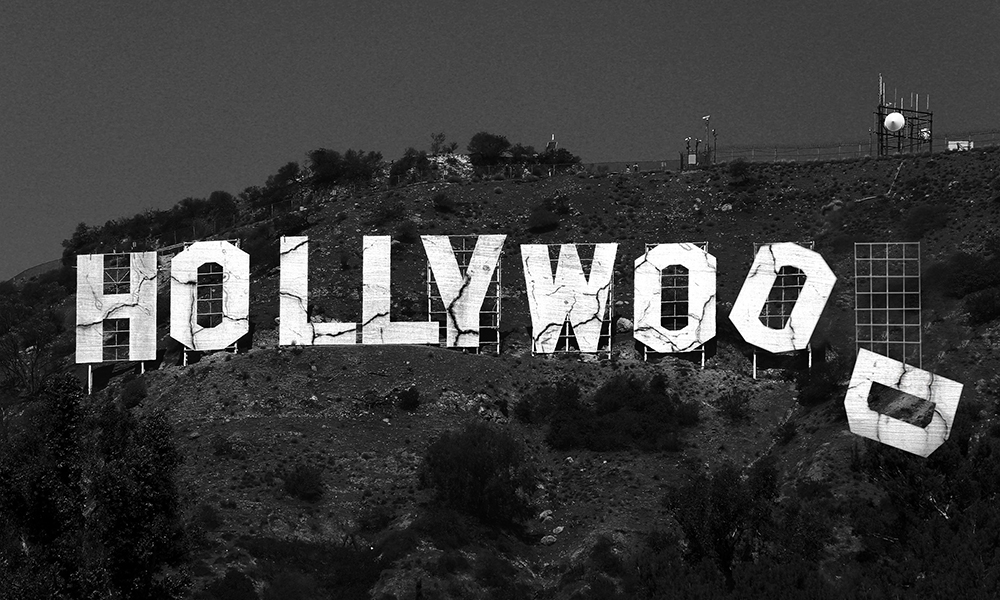
最近,“芭本海默”這個詞在好萊塢已經火出圈兒了——“芭本海默”指的是《芭比》和《奧本海默》這兩部新片,它們同時上映,又同時受到觀眾熱捧,成了近年來好萊塢罕見的文化現象。
這兩部片子表面上都是典型的好萊塢商業大片,但卻有著截然不同的內核——華納兄弟的出品的《芭比》聚焦女權主義語境下的矛盾,而環球公司的《奧本海默》講述了原子彈之父的故事。這兩部片子都在7月21日上映,僅在上映后的前兩個周末,便合力拿下12億美元的全球票房,成了好萊塢當之無愧的“年度電影”。
然而就在“芭本海默”歡慶大賣的背后,很多為制作這兩部電影付出大量心血的影業工人卻正在鬧罷工,罷工者中甚至還有一些明星,比如上個月剛剛參加了《奧本海默》首映式的希里安·墨菲、艾米麗·布朗特、馬特·達蒙和佛羅倫斯·珀等等,作為演員工會的成員,他們也加入了這次演員和編劇的聯合罷工 。
這次罷工是由美國編劇協會(WGA)和美國電視和廣播藝術家聯合會(SAG-AFTRA)聯合發起的,這也是1960年以來好萊塢演員和編劇的首次聯合罷工。目前整個美國娛樂業都處于停擺狀態,預計短期內這些影業工人是不會回來上班了。罷工者的訴求主要集中在基本的勞動保護問題,以及制片廠和流媒體公司采用的薪酬模式,此外罷工者們也抗議AI等技術在電影行業的使用。
不管這些糾紛最終如何解決,但此次罷工已經向外界揭露了一個殘酷的真相——美麗、藝術、財富,這些籠罩在好萊塢頭上的光環只是它呈現給外人的樣子,好萊塢本質上也只是一個無聊的職場,打工人在這里依然會面臨很多跟其他行業一樣的問題——比如剝削、虐待和歧視等等。
除了少數拿天價片酬的一線明星,大多數演員并沒有傳說中那么有錢。比如SAG-AFTRA的主席弗蘭·德雷斯徹指出,該組織85%以上的會員年收入還不到2.6萬美元,甚至夠不上享受醫保的門檻。比如《女子監獄》是網劇時代第一部爆火的美劇,它也幫助奠定了Netlfix今天的地位。但最近,出演過該劇的演員們向《紐約客》爆料,他們當演員的工資甚至交不起房租,有些人不得不打第二份工來補貼家用。再比如Hulu目前的熱播劇《熊家餐館》的一位編劇表示,當該劇獲得喜劇編劇獎時,他甚至連一套新西裝都買不起。
“很多人有一種文化誤解,覺得電影人是在追求藝術,是在追求創造性,因此好萊塢就有了更高的使命感,電影人似乎也變得高大上了起來。”莫琳·萊恩說。她是《燒毀:權力、共謀與好萊塢變革的呼聲》(Burn It Down: Power, Complicity, and a Call for Change in Hollywood)一書的作者,這本書尖銳揭露了好萊塢普遍存在的一些職場問題。
“總的來說,這個行業利用這種錯誤認知,掩蓋了大量的罪惡。”她說。
底層員工的經濟待遇過低問題已經引起了很多人的憤慨。在美國,CEO的薪酬往往是普通員工的幾百倍。比如華納兄弟發現公司的CEO大衛·扎斯拉夫已經成了行業的眾矢之的,因為他先是搞亂了CNN的領導層,又在特納經典電影頻道搞了一次廣受非議的大裁員,后來更是為了扣稅,從HBO頻道下架了多部影片和劇集。2022年,他主持了華納兄弟和探索公司的合并,并且拿到了2.47億美元的薪酬,《財富》也將他列為“財富500強”企業中“薪酬過高”排行榜的亞軍。(華納兄弟探索公司當時就拒絕評論此事。)
如果說貧富差距問題是干柴,那么好萊塢這幾年可以說一直在點火的邊緣瘋狂摩擦。先是制片人哈維·韋恩斯坦被指控30年騷擾女演員逾100人,再是“MeToo”運動和“奧斯卡太白”運動,這些都說明在美國娛樂業,騷擾、歧視和不公是家常便飯。這次罷工只是矛盾的一次總爆發,正如萊恩在她的書中深入揭露的那樣,這些問題都一直存在。
“我知道“MeToo”運動已經過去幾年了,但是我們并沒有解決這些問題,實際上,我們什么問題都沒有解決,這也是我寫這本書的原因之一。”
早在今年的好萊塢大罷工之前,萊恩就經常報道好萊塢的各種齟齬。萊恩是一名資深記者和電視評論員,目前任《名利場》雜志的特約編輯。她花了很多時間關注好萊塢在多元和包容方面存在的問題,并曾親自調查過美國娛樂行業的性騷擾等丑聞。
不過,等到2021年她動筆寫這本書的時候,美國電影業底層員工的憤怒和牢騷已經到了掩蓋不住的地步。隨著行業逐步從疫情危機中復蘇,人們愕然發現,流媒體時代的興起,對多數演員、編劇和電影工人來說竟然是一場災難。“到了去年年底,大家進入了一個非常困難的階段,大家能勉強糊口和保住自己的房子就算不錯了……我采訪過的每個人都在崩潰的邊緣。所以我認識到,我必須調整一下這本書的重心,不能光講性騷擾和丑聞,也要談談整個行業面臨的生存危機。”

莫琳·萊恩的新書《燒毀:權力、共謀與好萊塢變革的呼聲》(Burn It Down: Power, Complicity, and a Call for Change in Hollywood)揭露了美國影視行業的黑幕。
哈維·韋恩斯坦因為性騷擾事件塌房已經6年了,經過轟轟烈烈的#MeToo運動,很多人都接受了這樣一種觀念,即作為一個社會整體來說,導致這些性騷擾事件的系統性問題已經得到解決了。
“我有一種感覺,人們已經厭倦了這個行業的剝削和虐待的故事。我懂,因為我自己也厭倦了。”
她的解決方法,就是將她的宏大主題與這些系統性問題相結合,同時在更高的視角上解讀好萊塢的八卦。這本書對你最喜歡的美劇的幕后故事進行了生動、深入的挖掘報道。有些章節中的案例深刻說明了一些“有毒的職場行為”是怎樣在好萊塢得到原諒和鼓勵的。比如《迷失》劇組中“殘酷無情”和“種族歧視”的編劇室;《周六夜現場》數十年來的“嚴重不當行為、種族主義、性別歧視,以及各種形式的攻擊、藥物濫用和精神健康問題,這些問題還因惡劣的工作條件而加劇。”另外還有極具權勢的制片人斯科特·魯丁,他長期對助理動輒打罵,人稱“業內最卑鄙的老板之一”。(《迷失》的聯合制片人戴蒙·林道夫向萊恩坦承他“失敗了”,而《周六夜現場》的執行制片人洛恩·邁克爾斯則拒絕對萊恩的書發表評論。2021年,魯丁宣布他將“退出”自己的百老匯項目。)
不出所料,在《名利場》雜志刊登了她書中關于《迷失》的章節節選后,萊恩的報道迅速傳播開來,她的這本書也登上了《紐約時報》的暢銷書排行榜。
萊恩坦承:“這是我想引起人們注意的一種方式,但這也是為了讓大家意識到,如果你們認為種族歧視、性別歧視和各種施害行為已經是過去時了,那你們就大錯特錯了。”
萊恩這本書的獨特之處在于,她沒有將好萊塢當成一個藝術作品的搖籃,而是將其解構成一個職場——好萊塢的所有職場問題,是美國所有企業和打工人都能共情的。資本家希望從勞動力身上壓榨利潤,而工人的薪資待遇卻越來越差——哪怕是那些原本薪酬更高、保障更好的所謂“白領工人”,因此雙方的沖突也愈發頻繁。如今的科技公司、咨詢巨頭、律師事務所乃至大學都在想方設法把員工變成“零工”。但一旦變成零工,你將失去工齡,失去收入穩定的收入保障,甚至無法對自己的工作成果擁有所有權。而與此同時,CEO們卻在公開討論擁抱人工智能,以及如何用AI取代那些討厭的人類。
所以,很多口中的所謂“夢想中的工作”,就算它曾經存在過,現在也瀕臨滅絕了。這一點在好萊塢表現得最為明顯,在創意烏托邦的光鮮神話背后,殘酷的現實已經讓人越來越難以忽視。
對萊恩本人來說,她的好萊塢夢很久以前就破滅了。“我兒子也是一名音樂人和制作人,我完全支持他從事這種創造性的工作。但我寧愿讓他去銀行當一個柜員,也不愿意讓他去好萊塢工作。” 她說。(財富中文網)
譯者:樸成奎
最近,“芭本海默”這個詞在好萊塢已經火出圈兒了——“芭本海默”指的是《芭比》和《奧本海默》這兩部新片,它們同時上映,又同時受到觀眾熱捧,成了近年來好萊塢罕見的文化現象。
這兩部片子表面上都是典型的好萊塢商業大片,但卻有著截然不同的內核——華納兄弟的出品的《芭比》聚焦女權主義語境下的矛盾,而環球公司的《奧本海默》講述了原子彈之父的故事。這兩部片子都在7月21日上映,僅在上映后的前兩個周末,便合力拿下12億美元的全球票房,成了好萊塢當之無愧的“年度電影”。
然而就在“芭本海默”歡慶大賣的背后,很多為制作這兩部電影付出大量心血的影業工人卻正在鬧罷工,罷工者中甚至還有一些明星,比如上個月剛剛參加了《奧本海默》首映式的希里安·墨菲、艾米麗·布朗特、馬特·達蒙和佛羅倫斯·珀等等,作為演員工會的成員,他們也加入了這次演員和編劇的聯合罷工 。
這次罷工是由美國編劇協會(WGA)和美國電視和廣播藝術家聯合會(SAG-AFTRA)聯合發起的,這也是1960年以來好萊塢演員和編劇的首次聯合罷工。目前整個美國娛樂業都處于停擺狀態,預計短期內這些影業工人是不會回來上班了。罷工者的訴求主要集中在基本的勞動保護問題,以及制片廠和流媒體公司采用的薪酬模式,此外罷工者們也抗議AI等技術在電影行業的使用。
不管這些糾紛最終如何解決,但此次罷工已經向外界揭露了一個殘酷的真相——美麗、藝術、財富,這些籠罩在好萊塢頭上的光環只是它呈現給外人的樣子,好萊塢本質上也只是一個無聊的職場,打工人在這里依然會面臨很多跟其他行業一樣的問題——比如剝削、虐待和歧視等等。
除了少數拿天價片酬的一線明星,大多數演員并沒有傳說中那么有錢。比如SAG-AFTRA的主席弗蘭·德雷斯徹指出,該組織85%以上的會員年收入還不到2.6萬美元,甚至夠不上享受醫保的門檻。比如《女子監獄》是網劇時代第一部爆火的美劇,它也幫助奠定了Netlfix今天的地位。但最近,出演過該劇的演員們向《紐約客》爆料,他們當演員的工資甚至交不起房租,有些人不得不打第二份工來補貼家用。再比如Hulu目前的熱播劇《熊家餐館》的一位編劇表示,當該劇獲得喜劇編劇獎時,他甚至連一套新西裝都買不起。
“很多人有一種文化誤解,覺得電影人是在追求藝術,是在追求創造性,因此好萊塢就有了更高的使命感,電影人似乎也變得高大上了起來。”莫琳·萊恩說。她是《燒毀:權力、共謀與好萊塢變革的呼聲》(Burn It Down: Power, Complicity, and a Call for Change in Hollywood)一書的作者,這本書尖銳揭露了好萊塢普遍存在的一些職場問題。
“總的來說,這個行業利用這種錯誤認知,掩蓋了大量的罪惡。”她說。
底層員工的經濟待遇過低問題已經引起了很多人的憤慨。在美國,CEO的薪酬往往是普通員工的幾百倍。比如華納兄弟發現公司的CEO大衛·扎斯拉夫已經成了行業的眾矢之的,因為他先是搞亂了CNN的領導層,又在特納經典電影頻道搞了一次廣受非議的大裁員,后來更是為了扣稅,從HBO頻道下架了多部影片和劇集。2022年,他主持了華納兄弟和探索公司的合并,并且拿到了2.47億美元的薪酬,《財富》也將他列為“財富500強”企業中“薪酬過高”排行榜的亞軍。(華納兄弟探索公司當時就拒絕評論此事。)
如果說貧富差距問題是干柴,那么好萊塢這幾年可以說一直在點火的邊緣瘋狂摩擦。先是制片人哈維·韋恩斯坦被指控30年騷擾女演員逾100人,再是“MeToo”運動和“奧斯卡太白”運動,這些都說明在美國娛樂業,騷擾、歧視和不公是家常便飯。這次罷工只是矛盾的一次總爆發,正如萊恩在她的書中深入揭露的那樣,這些問題都一直存在。
“我知道“MeToo”運動已經過去幾年了,但是我們并沒有解決這些問題,實際上,我們什么問題都沒有解決,這也是我寫這本書的原因之一。”
早在今年的好萊塢大罷工之前,萊恩就經常報道好萊塢的各種齟齬。萊恩是一名資深記者和電視評論員,目前任《名利場》雜志的特約編輯。她花了很多時間關注好萊塢在多元和包容方面存在的問題,并曾親自調查過美國娛樂行業的性騷擾等丑聞。
不過,等到2021年她動筆寫這本書的時候,美國電影業底層員工的憤怒和牢騷已經到了掩蓋不住的地步。隨著行業逐步從疫情危機中復蘇,人們愕然發現,流媒體時代的興起,對多數演員、編劇和電影工人來說竟然是一場災難。“到了去年年底,大家進入了一個非常困難的階段,大家能勉強糊口和保住自己的房子就算不錯了……我采訪過的每個人都在崩潰的邊緣。所以我認識到,我必須調整一下這本書的重心,不能光講性騷擾和丑聞,也要談談整個行業面臨的生存危機。”
莫琳·萊恩的新書《燒毀:權力、共謀與好萊塢變革的呼聲》(Burn It Down: Power, Complicity, and a Call for Change in Hollywood)揭露了美國影視行業的黑幕。
哈維·韋恩斯坦因為性騷擾事件塌房已經6年了,經過轟轟烈烈的#MeToo運動,很多人都接受了這樣一種觀念,即作為一個社會整體來說,導致這些性騷擾事件的系統性問題已經得到解決了。
“我有一種感覺,人們已經厭倦了這個行業的剝削和虐待的故事。我懂,因為我自己也厭倦了。”
她的解決方法,就是將她的宏大主題與這些系統性問題相結合,同時在更高的視角上解讀好萊塢的八卦。這本書對你最喜歡的美劇的幕后故事進行了生動、深入的挖掘報道。有些章節中的案例深刻說明了一些“有毒的職場行為”是怎樣在好萊塢得到原諒和鼓勵的。比如《迷失》劇組中“殘酷無情”和“種族歧視”的編劇室;《周六夜現場》數十年來的“嚴重不當行為、種族主義、性別歧視,以及各種形式的攻擊、藥物濫用和精神健康問題,這些問題還因惡劣的工作條件而加劇。”另外還有極具權勢的制片人斯科特·魯丁,他長期對助理動輒打罵,人稱“業內最卑鄙的老板之一”。(《迷失》的聯合制片人戴蒙·林道夫向萊恩坦承他“失敗了”,而《周六夜現場》的執行制片人洛恩·邁克爾斯則拒絕對萊恩的書發表評論。2021年,魯丁宣布他將“退出”自己的百老匯項目。)
不出所料,在《名利場》雜志刊登了她書中關于《迷失》的章節節選后,萊恩的報道迅速傳播開來,她的這本書也登上了《紐約時報》的暢銷書排行榜。
萊恩坦承:“這是我想引起人們注意的一種方式,但這也是為了讓大家意識到,如果你們認為種族歧視、性別歧視和各種施害行為已經是過去時了,那你們就大錯特錯了。”
萊恩這本書的獨特之處在于,她沒有將好萊塢當成一個藝術作品的搖籃,而是將其解構成一個職場——好萊塢的所有職場問題,是美國所有企業和打工人都能共情的。資本家希望從勞動力身上壓榨利潤,而工人的薪資待遇卻越來越差——哪怕是那些原本薪酬更高、保障更好的所謂“白領工人”,因此雙方的沖突也愈發頻繁。如今的科技公司、咨詢巨頭、律師事務所乃至大學都在想方設法把員工變成“零工”。但一旦變成零工,你將失去工齡,失去收入穩定的收入保障,甚至無法對自己的工作成果擁有所有權。而與此同時,CEO們卻在公開討論擁抱人工智能,以及如何用AI取代那些討厭的人類。
所以,很多口中的所謂“夢想中的工作”,就算它曾經存在過,現在也瀕臨滅絕了。這一點在好萊塢表現得最為明顯,在創意烏托邦的光鮮神話背后,殘酷的現實已經讓人越來越難以忽視。
對萊恩本人來說,她的好萊塢夢很久以前就破滅了。“我兒子也是一名音樂人和制作人,我完全支持他從事這種創造性的工作。但我寧愿讓他去銀行當一個柜員,也不愿意讓他去好萊塢工作。” 她說。(財富中文網)
譯者:樸成奎
Hollywood’s “Barbenheimer” extravaganza, bristling with industry tension, has turned into one of corporate America’s weirder public celebrations in recent memory.
The surface was all Hollywood glitz and glamour: Two very different films—Warner Bros.’ Barbie, about the feminist contradictions of an iconic doll, and Universal’s Oppenheimer, about the anguished maker of the atomic bomb—were both released July 21 and earned a combined $1.2 billion in global ticket sales over their first two weekends, generating headlines about “the movie event of the year.”
But behind the celebratory scenes, many of the Hollywood workers who actually created these business hits are on strike. Those workers include the stars, as was vividly illustrated by Cillian Murphy, Emily Blunt, Matt Damon, and Florence Pugh walking out of an Oppenheimer premiere last month, as the actors’ union joined striking writers.
The double strikes of the Writers Guild of America (WGA) and the Screen Actors Guild–American Federation of Television and Radio Artists (SAG-AFTRA)—the first such joint action since 1960—have effectively shut down the entertainment industry. And the workers are not expected to come back anytime soon. At stake are basic workplace protections and pay models used by movie studios and streaming companies, as well as these employers’ use of artificial intelligence and other technology.
But however these labor disputes are resolved, the revelations that have come out of them have already undermined much of Hollywood’s carefully crafted reputation as a land of beauty, art, and wealth. Instead, it’s becoming clear, this is just another boring old workplace, where workers face many of the same problems—exploitation, abuse, discrimination—they encounter elsewhere in corporate America.
Behind the headline salaries of A-list celebrities, most on-screen actors don’t have access to all that fabled wealth. More than 85% of those represented by SAG-AFTRA don’t make the $26,000 annually needed to qualify for health benefits, according to union president Fran Drescher. Actors in Orange Is the New Black—one of the first breakout hits of the streaming era, which helped put Netflix on the map—recently told The New Yorker they were paid so little that some had to take second jobs in order to afford their rent. One of the writers for The Bear, Hulu’s current buzzy darling, has said he couldn’t afford a new suit when the show won an award for comedy writing.
“There is this huge cultural myth that, because people are pursuing artistic or creative goals, Hollywood has some higher purpose—and a better reputation,” says Maureen Ryan, author of Burn It Down: Power, Complicity, and a Call for Change in Hollywood, a scathing new book on the entertainment industry’s pervasive workplace problems.
“As a whole,” she adds, “the industry has used that false perception to cover up a multitude of sins.”
These stories of rank-and-file economic misery have fueled an outrage common across corporate America, where the average CEO makes several hundred times what they pay a typical employee. Warner Bros. Discovery CEO David Zaslav, for example, has become an industry lightning rod after presiding over the leadership turmoil at CNN, widely criticized layoffs at Turner Classic Movies, and the coldly financial decisions to make movies and TV shows disappear from HBO (or never release them in the first place) for tax write-offs. In 2022, as he orchestrated the merger of Warner and Discovery and was awarded a compensation package worth $247 million, Fortune named Zaslav the second-most “overpaid” CEO on the Fortune 500. (Warner Bros. Discovery declined to comment on the ranking at the time.)
But if financial disparities between executives and workers are the tinder, to borrow Ryan’s Burn It Down metaphor, Hollywood has been stockpiling the fuel for years. After Harvey Weinstein, #MeToo, #OscarsSoWhite, and waves of other reckonings over widespread inequality, discrimination, and harassment in the entertainment industry, the cumulative effect of striking workers’ stories has laid bare the fundamental workplace problems that, as Ryan’s book deeply reports, have always existed.
“Part of the reason I wrote the book was to say, ‘Look, I know we’re a few years on from #MeToo. But…guys, we didn’t fix it,’” she says. “Nothing is fixed.”
Ryan was covering various tensions in Hollywood long before this year’s strikes began. A veteran reporter and TV critic who’s currently a contributing editor at Vanity Fair, she has spent much of her career covering Hollywood’s problems with diversity and inclusion, and investigating sexual harassment and other examples of workplace misconduct across the entertainment industry.
But by the time she started writing her book in 2021, the rumblings of broader labor unrest were hard to ignore. As the entertainment industry started to come out of the existential crisis caused by the pandemic, it was increasingly clear that the “golden age of streaming” was a financial disaster for most writers, actors, and other workers. “By the end of last year, it seems to have gotten to such a very difficult stage in terms of people just being able to pay their bills and keep their houses that…everyone I spoke to was at a boiling point of frustration,” Ryan says. “I realized that I had to pivot the book a bit more, to not just issues of harassment, abuse, and misconduct…but the existential crises facing the industry.”
Maureen Ryan’s new book, “Burn It Down: Power, Complicity, and a Call for Change in Hollywood,” explores the toxic experiences of working in film and TV.
Expanding her focus also helped address a frustrating dilemma of the post-#MeToo era: Almost six years after Harvey Weinstein’s downfall, many are eager to embrace the idea that Hollywood—and for that matter all of society—has “fixed” the systemic problems that made his abuses possible.
“I had the sense that people were tired of stories about misconduct, mistreatment, abuse, and exploitation in the industry,” Ryan says. “I get it, because I get tired of it.”
Her solution was to marry her larger thesis about these ongoing, systemic problems with a high-minded version of Hollywood gossip: juicy, headline-grabbing, deep reporting about the awful things that were really going on behind the scenes of your favorite TV show. Some of her book’s best chapters dive into nuanced and upsetting examples of how “toxic workplace behavior” has been condoned and rewarded across Hollywood. Case studies include Lost’s “relentlessly cruel” and “racist” writers room; Saturday Night Live’s decades of “gross misconduct, racism, sexism, abusive dynamics, various forms of assault, substance abuse, and mental health struggles exacerbated by punishing working conditions”; and the long track record of powerful producer Scott Rudin, widely reported to be physically abusive toward his assistants and “one of the vilest bosses in the industry.” (Lost cocreator Damon Lindelof acknowledged to Ryan that he “failed,” while SNL executive producer Lorne Michaels declined to comment for her book. In 2021, Rudin announced that he would “step back” from his projects.)
Sure enough, after Vanity Fair ran a Burn It Down excerpt about Lost, Ryan’s reporting went viral—and vaulted her book onto the New York Times bestseller list.
“That was part of the way that I thought I would get people’s attention,” Ryan acknowledges, “but it was also just to point out that, if people think that moments of racial [and] sexist bias” and generally abusive behavior “are gone, they’re very much mistaken.”
Ryan savvily presents Hollywood and the entertainment industry not just as the wellspring of your favorite movies and TV shows, but as a workplace—with all the workplace problems that are familiar across corporate America. Disputes between employers, eager to squeeze all possible profits and shareholder value out of their labor force, and the workers actually creating the product are increasing outside of Tinseltown, too—including for white-collar or “knowledge” jobs that were once widely considered to be better paid, more prestigious, and more protected. Today, law firms, consulting giants, tech companies, and universities are trying to turn employees into, essentially, gig workers without job longevity or the security of a consistent paycheck, let alone ownership of their work output. CEOs publicly discuss embracing A.I.—and boast about using it to replace those pesky humans.
So the “dream job,” if it ever existed, is endangered everywhere these days. Nowhere is that more evident than in Hollywood, where the grim reality beneath the shiny myth of a creative utopia is increasingly hard to ignore.
For Ryan herself, that Hollywood dream was deflated long ago. “My son is a musician and a producer, and I support his creative work completely,” she told me. “But I would rather have him go work as a teller in a bank than work on a Hollywood set.”






